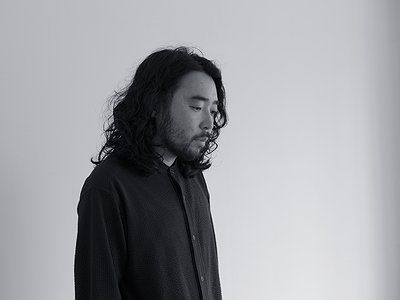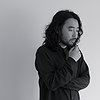Could you describe your creative process on the basis of a piece or album that's particularly dear to you, please? Where did the ideas come from, how were they transformed in your mind, what did you start with and how do you refine these beginnings into the finished work of art?
I'll take my recent album ‘In The Dark Woods’ . In the beginning, I wanted to focus on my mind deeply and wanted to hear the sounds come from inside of me. I wanted to find my own silence and face it first. It was a very personal challenge for me, but I was absolutely convinced I should do it. Actually my child, two years old’ boy is a huge inspiration for me since he was born and I learned many fresh things from him. For example, before I thought that most parts of the character building will be formed under the influence of the environment in a growth process. However, my son, after he stands up alone, he has already his own character and personality. Furthermore, he reminds me of my parents and grandparents. Then I’m sure the blood relation is huge and the role of DNA surpasses my imagination. This experience remains in my mind and I guess it has an influence on my recent album. So it was a very personal work for me in the beginning, focusing on the silence in my mind. However, the theme of this album is a more expansive universe - like the cycle of nature in the end.
There are many descriptions of the ideal state of mind for being creative. What is it like for you? What supports this ideal state of mind and what are distractions? Are there strategies to enter into this state more easily?
Actually, I don’t know well. I’ve been working as a composer for approximately ten years and I have the skills to make the music exactly the way I imagined it, certainly compared with the past. However, the very first part of creativity always happens suddenly and it is never controlled by my intention. It looks like a miracle always. I like to compose music but it’s not only fun, it’s actually very tough work. I’m always waiting for it to happen. If there are any ideal states of mind or strategies to enter into this, I would like to know them, of course. However, there is no easy way.
How is playing live and writing music in the studio connected? What do you achieve and draw from each experience personally? How do you see the relationship between improvisation and composition in this regard?
Playing live is a performance for an audience and writing music is the conversation with my mind. The purpose is different for me. In my case, when it comes to composition, I have two ways of composing, actually. The first way is that I improvise on the piano or some instruments and find a melody or harmony. Something small touches to my mind in the beginning and later I start to compose/arrange in earnest. The second way is that I just write the music sounding in my mind. So, for me, improvisation and composition are part of a very close partnership.
How do you see the relationship between the 'sound' aspects of music and the 'composition' aspects? How do you work with sound and timbre to meet certain production ideas and in which way can certain sounds already take on compositional qualities?
They are strongly connected for me. Strictly speaking, the ‘sound’ aspects of music are connected with the arrangement part of the composition. I work on the mix with the acoustic sounds and electronic sounds. Using the pianos, strings, some instruments and the field recordings in the computer and also using the synthesizers, keyboards, effects, plugins. I test some patterns to mix them and find the interesting sounds for the music. This experiment is a part of the composition / arrangement for me.
Our sense of hearing shares intriguing connections to other senses. From your experience, what are some of the most inspiring overlaps between different senses - and what do they tell us about the way our senses work? What happens to sound at its outermost borders?
Put on an earphone (small sounds) and walk around. I always carefully listen to the music overlapping the sounds of the world. It is very unique and beautiful. There are many inspiring overlaps in the world.
Art can be a purpose in its own right, but it can also directly feed back into everyday life, take on a social and political role and lead to more engagement. Can you describe your approach to art and being an artist?
I’m not an artist. For me, in my life, music is essential, like eating, sleeping, breathing. My purpose is to make music and I don’t need any other reasons for making music. If my music takes on a social and political role and leads to more engagement, that would be wonderful. But I'm not actually interested in that.
It is remarkable, in a way, that we have arrived in the 21st century with the basic concept of music still intact. Do you have a vision of music, an idea of what music could be beyond its current form?
I’m always looking foward to fresh ideas for making music. Because I want to listen to new music I have never listened to yet. To realise it, technology is the most important thing. I need to use it in a unique way and also mix it as a reference the legacy of the legendary composers from the past.



